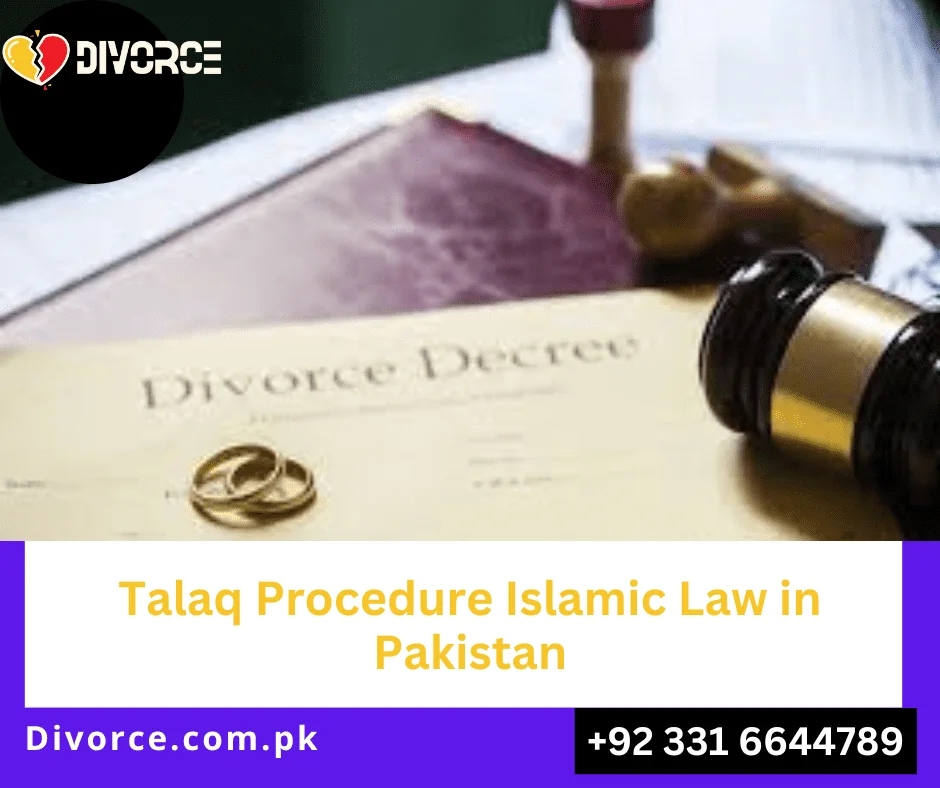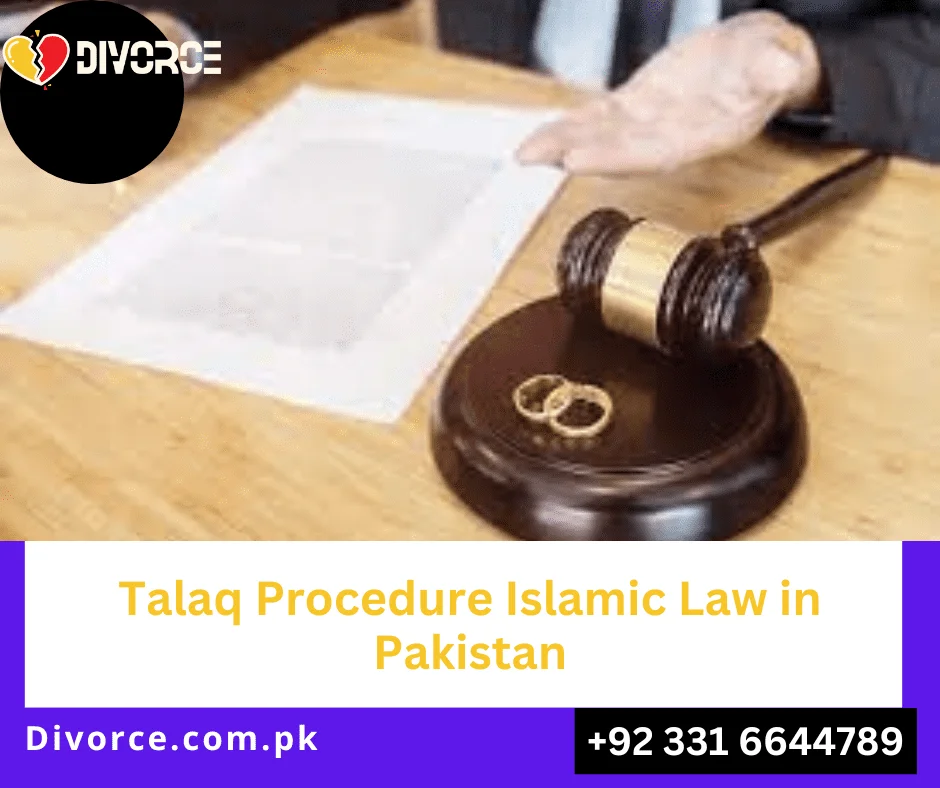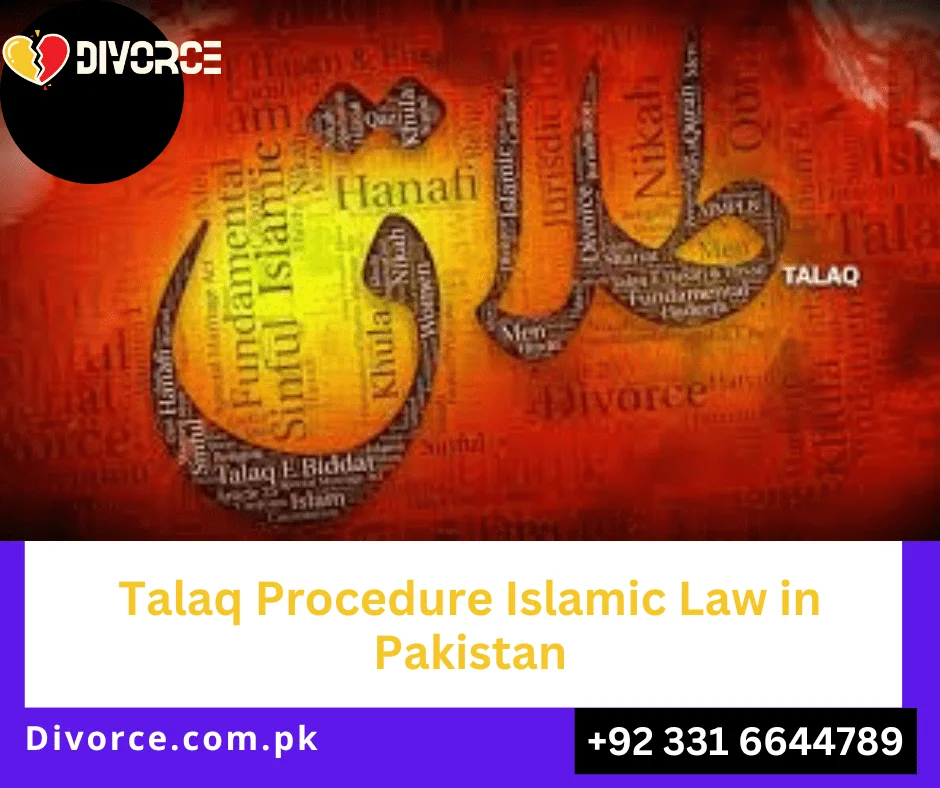Talaq Procedure Islamic Law in Pakistan
Talaq Procedure: Islamic Law and Divorce in Pakistan
Unlocking the complexities of divorce in Islamic law, this blog post delves into the intricacies of Talaq – a procedure deeply rooted in Quranic principles. In a society where marriage is considered sacred, understanding the process and implications of Talaq is crucial. From exploring its historical changes to discussing contemporary reforms, we aim to shed light on this sensitive topic while examining its impact on individuals and society. So fasten your seatbelts as we embark on a journey through the realms of Talaq – navigating its legal procedures, societal challenges, and potential for women’s empowerment.
Divorce/Talaq in Quranic Principles: Navigating History, Culture, and Reform
Quranic principles form the foundation of Islamic law, including divorce procedures. Focusing on justice, compassion, and the preservation of family ties, these principles guide navigating the complexities of Talaq, following religious teachings.
Talaq (Repudiation) in Islamic Law
Talaq, also known as repudiation, is significant in Islamic Law. It is the process by which a marriage can be dissolved according to Quranic principles and procedures. Understanding this concept is crucial to grasping the complexities surrounding divorce within Islamic law.
Meaning and significance of Talaq
Talaq, a term rooted in Islamic law, is immensely significant in the lives of many Muslims. It refers to the repudiation or dissolution of marriage. Understanding its meaning and cultural relevance is crucial for comprehending divorce’s complexities within this religious framework.
Talaq process and procedures
In Islamic law, the process and procedures of Talaq, or repudiation, are governed by Quranic principles. It involves the husband expressing his desire for a divorce to his wife. The specific method and conditions vary depending on cultural interpretations, but it is a significant event for both parties involved.
Talaq and its consequences
Divorce is a significant decision with far-reaching consequences. Talaq, under Islamic law, ends the marriage contract. It affects not only the couple but also their children and families. The emotional, financial, and social implications can be profound and long-lasting.


Judicial divorce procedures and legal implications
Judicial divorce procedures in Islamic law involve seeking legal intervention to dissolve a marriage. These procedures have significant legal implications, requiring evidence and adherence to specific rules and regulations.
Legal Transformation and Methods of Reform
Legal transformation and reform methods have been instrumental in shaping divorce procedures in Islamic law. Efforts to modernize divorce laws and make them more equitable continue to evolve, reflecting the changing needs and aspirations of individuals within Pakistani society.
Historical changes in divorce practices in Islamic law
Historical changes in divorce practices in Islamic law have seen variations across different regions and periods. These changes reflect the evolving cultural, social, and political contexts that shape interpretations of divorce within the framework of Islamic principles.
Methods and efforts for reforming divorce laws
Methods and efforts for reforming divorce laws involve advocating for gender equality, promoting women’s rights, and challenging patriarchal norms. It also includes raising awareness about the negative impact of discriminatory laws and pushing for legal amendments to ensure fairness in divorce proceedings.
Impact of cultural and social factors on divorce procedures
Divorce procedures in Islamic law are influenced by various cultural and social factors, which can shape the way divorces are handled within a community. These factors include societal norms, traditions, gender roles, and religious interpretations. They play a significant role in determining the perceptions and acceptance of divorce within a particular culture or society.
Prevalence and Impact of Divorce in Pakistani Society
Divorce rates in Pakistan have steadily increased, reflecting changing societal norms and attitudes toward marriage. The impact of divorce is far-reaching, affecting individuals emotionally, socially, and financially. Its prevalence highlights the need for a deeper understanding of the factors contributing to marital breakdowns in Pakistani society.
Statistics on divorce rates in Pakistan
Divorce rates in Pakistan have risen in recent years, reflecting evolving societal norms and changing dynamics within relationships. While precise statistics can vary, studies indicate that divorce rates are increasing, highlighting the need for further understanding and support for individuals navigating this challenging process.
Societal impact and issues faced by divorced individuals
Divorce can have far-reaching consequences on individuals and society. Divorced individuals often face emotional trauma, financial struggles, and social stigma. These challenges impact their mental well-being, relationships with children, and societal place. Let’s delve deeper into the societal impact of divorce in Pakistan.
Cultural and religious perspectives on divorce in Pakistan
Cultural and religious perspectives on divorce in Pakistan vary greatly, with some communities viewing it as a last resort while others consider it taboo. Islamic beliefs emphasize the importance of marriage and encourage reconciliation, but societal norms can sometimes hinder the process of divorce.


Reflection on the importance and complexities of divorce in Islamic law
Divorce in Islamic law holds significant importance and is accompanied by various complexities. It reflects the recognition of human fallibility and the need for resolution in troubled marriages. Understanding these intricacies is crucial to navigating the challenges faced by individuals seeking dissolution of their union.
Mediation and Counseling in Talaq Cases
Mediation and counseling are crucial in Talaq cases, allowing couples to explore reconciliation and find common ground. These interventions can address underlying issues, promote understanding, and potentially avert the dissolution of marriage. Mediation and counseling play pivotal roles in Talaq cases, addressing Islamic law’s legal, emotional, and social dimensions of marital dissolution. Talaq, the divorce process in Islamic tradition, can be emotionally charged and tumultuous, impacting the couple involved and their families and communities.
Talaq Mediation and Counseling: Nurturing Communication and Emotional Well-being
Mediation, often facilitated by religious scholars or trained professionals, aims to bring both parties to the table to engage in constructive dialogue. It allows couples to discuss their grievances, feelings, and concerns openly. Mediators help mediate disputes, clarify misunderstandings, and work toward a mutually acceptable resolution. The goal is to find common ground, explore potential compromises, and salvage the marriage. Conversely, counseling focuses on the emotional well-being of the individuals involved in the Talaq process.
Talaq Mediation and Counseling: Nurturing Support and Minimizing Divorce Impact
Mediation and counseling create a comprehensive support system for couples navigating Talaq. They promote healthy communication, empathy, and understanding, which can lead to reconciliation or a smoother divorce process if reconciliation isn’t possible. Moreover, they help minimize the adverse effects of divorce, particularly on children who may witness the dissolution of their parents’ marriage.
Talaq in Pakistan: Promoting Mediation and Counseling for Lasting Resolutions
In Pakistan, where Talaq is a significant part of the legal and cultural landscape, incorporating mediation and counseling services into the divorce process underscores the commitment to ensuring divorce is a last resort. It encourages couples to explore all possible avenues of reconciliation before proceeding with the formal Talaq process, ultimately striving to protect all parties’ emotional and psychological well-being.
Legal Challenges in Pursuing Talaq
Navigating the legal system can pose significant challenges for individuals seeking a divorce through talaq. From complex documentation requirements to lengthy court proceedings, the process can be daunting and emotionally draining. However, with proper legal support, these challenges can be overcome.
Economic Consequences of Talaq
Talaq, the Islamic divorce procedure, often carries significant economic consequences. Women are usually left financially vulnerable and may struggle to support themselves and their children. This highlights the importance of addressing financial aspects when considering Talaq reforms.
Talaq and Children’s Well-being
When it comes to divorce, the well-being of children should always be a priority. Talaq can have a significant impact on them, emotionally and psychologically. Ensuring they are supported throughout this difficult time with their best interests at heart is crucial.
Talaq and Children’s Well-being: Navigating the Emotional Impact
Talaq, the Islamic divorce process, has far-reaching consequences not only for the spouses involved but also for their children. The well-being of children is a paramount concern when navigating Talaq, as the dissolution of a marital union can significantly impact their emotional and psychological development. First and foremost, children often find themselves caught in the crossfire of their parents’ divorce, bearing witness to heated disputes, emotional distress, and the breakdown of their family unit. This exposure to conflict can lead to various adverse effects, including increased stress, anxiety, and depression. Children may struggle to comprehend the reasons behind the divorce and may internalize feelings of guilt or responsibility for their parent’s separation.


Talaq and Children’s Well-being: Navigating the Challenges of Living Arrangements
The living arrangements following Talaq can disrupt a child’s sense of stability and security. Custody battles, changes in residence, and adjustments to visitation schedules can create a sense of instability, leaving children feeling unsettled and insecure. Maintaining a consistent routine and ensuring parents remain actively involved in their children’s lives can help mitigate some of these challenges.
Talaq and Children’s Well-being: The Importance of Communication and Financial Support
Communication is another critical factor in safeguarding children’s well-being during Talaq. Parents must maintain open and honest dialogues with their children, explaining the situation age-appropriately. Encouraging children to express their feelings and concerns can help them cope with the emotional upheaval caused by divorce. The financial aspects of Talaq can also impact children’s well-being. Custodial parents may face economic challenges, which can, in turn, affect the children’s access to necessities, educational opportunities, and extracurricular activities.
Role of Lawyers in Talaq Proceedings
Lawyers play a crucial role in guiding individuals through the complex process of talaq. They provide legal advice, ensure proper documentation, and represent clients in court. Their expertise helps protect the rights and interests of those going through this difficult time.
Talaq Reforms and Women’s Rights
Efforts to reform divorce laws regarding women’s rights have gained momentum in recent years. These reforms aim to provide better protection and empowerment for women undergoing the talaq process, addressing issues such as financial security, custody rights, and property ownership.
Talaq and Property Rights for Women
Regarding divorce, property rights for women in Talaq cases have been a contentious issue. Understanding and ensuring fair distribution of assets is crucial for empowering women and providing them with financial security post-divorce.
The Role of Witnesses in Talaq
In Islamic law, witnesses play a crucial role in the process of talaq. Their presence during the pronouncement of divorce ensures its validity and authenticity. Witness testimony adds credibility to the divorce proceedings, safeguarding the rights of all parties involved. In the context of Talaq, witnesses play a critical role in ensuring the validity and transparency of the divorce process in Islamic law. When a husband pronounces Talaq, it must be done in the presence of two adult Muslim witnesses who are morally upright and just. These witnesses testify that the divorce declaration has occurred, and their company is crucial for legal documentation and legitimacy.
Talaq and Women’s Empowerment
Talaq has significant implications for women’s empowerment in Pakistani society. As divorce rates rise, exploring how the process can hinder or promote women’s rights, autonomy, and overall empowerment is essential. Talaq, the Islamic divorce process, holds a complex relationship with women’s empowerment in many societies, including Pakistan. While Talaq provides women with a legal mechanism to end an unhappy marriage and regain personal freedom, the experience can vary widely depending on cultural norms, legal frameworks, and individual circumstances.
Talaq: Empowering Women to Break Free, Overcoming Challenges
In cases where women initiate Talaq, it can be a powerful tool for their empowerment. It grants them the agency to break free from abusive or oppressive marriages, helping them escape domestic violence or neglect. Talaq provides women with the legal recognition of their right to dissolve a union that no longer serves their well-being, contributing to their emotional and psychological liberation. In some instances, cultural norms and societal pressures can hinder women from exercising this right freely. The fear of social stigma or family backlash may discourage women from pursuing divorce even when it is in their best interest.
Talaq and Religious Diversity in Pakistan
Pakistan, with its diverse religious landscape, faces unique challenges regarding talaq. Different religious communities have varying interpretations and practices regarding divorce, adding complexity to the legal system. This diversity calls for careful consideration of individual rights and religious freedoms. Talaq, the Islamic divorce process, is deeply intertwined with religious diversity in Pakistan, a country with a predominantly Muslim population and a significant sacred minority presence.


Talaq and Religious Diversity in Pakistan: Intersections and Legal Choices
Beyond the Muslim majority, Pakistan has various religious minorities, including Christians, Hindus, Sikhs, and others. These religious communities have legal frameworks for marriage and divorce, which may differ significantly from Islamic law. For instance, Christian divorce proceedings are governed by the Christian Divorce Act, while Hindu and Sikh marriages and divorces are subject to their respective personal laws.
Talaq and Religious Diversity in Pakistan: Legal Frameworks and Individual Rights
Pakistan’s legal system recognizes these diverse religious frameworks, and individuals can often choose which set of laws to follow in their marriage and divorce matters. However, this diversity also underscores the importance of legal awareness and ensuring that individuals’ rights are protected, regardless of their religious affiliation. Talaq and religious diversity in Pakistan are interconnected in a complex tapestry of legal and cultural variations.
Talaq and Personal Freedom
Personal freedom is a fundamental right that every individual should be able to exercise. In the context of divorce, personal freedom plays a significant role in allowing individuals to make decisions about their own lives and well-being. Talaq has been subject to various interpretations and reforms as an Islamic practice. Talaq, the Islamic divorce process, holds significant implications for personal freedom, particularly for the individuals seeking its dissolution. It represents a complex interplay between personal autonomy, cultural norms, and religious beliefs, raising questions about how individuals can exercise their freedom within the bounds of Islamic law.
Talaq: A Path to Personal Freedom from Unhappy Marriages
For those who seek Talaq, it often represents an essential pathway to regain personal freedom from an unhappy or unsustainable marriage. It provides individuals, both men and women, with the legal means to end a marital union that no longer serves their emotional, social, or psychological well-being. This autonomy can be especially crucial in situations involving abuse, neglect, or irreconcilable differences, where personal freedom may be restricted within the confines of the marriage.
Talaq and Personal Freedom: The Complex Interplay of Societal Norms
Personal freedom within the context of Talaq is not without its complexities. Cultural and societal norms in many regions often pressure individuals to maintain the sanctity of marriage, even in adverse circumstances. The fear of social stigma, ostracism, or familial disapproval can hinder one’s ability to exercise their freedom through divorce. This dilemma reflects the tension between personal autonomy and societal expectations.
Talaq and Personal Freedom: Navigating Gender Disparities and Cultural Pressures
Talaq may only sometimes provide equal freedom for both spouses, as interpretations and practices of Islamic divorce law can vary widely. In some cases, women may face more significant challenges in initiating Talaq due to societal and legal barriers, limiting their freedom compared to their male counterparts. This gender disparity highlights the need for reforms that ensure equitable access to divorce for all individuals. Talaq and personal space are intrinsically linked, with the process as a legal means to liberate individuals from unhappy or unhealthy marriages.
The Talaq Debate: Balancing Freedom and Concerns
While some argue that talaq allows women to end an unhappy marriage, others highlight concerns regarding its misuse and potential negative consequences for women. The debate surrounding talaq reflects the ongoing struggle between tradition and modernity in many societies, including Pakistan. It is essential to recognize that personal freedom encompasses the right to initiate divorce and the ability to do so without facing social stigma or discrimination. Society must create an environment where individuals can freely exercise their rights while addressing any negative implications of divorce.
Talaq in Islamic Law: Navigating History, Culture, and Reform
Understanding the complexities of talaq within Islamic law requires careful consideration of historical practices, cultural influences, legal reforms, and societal attitudes toward divorce. While there are ongoing debates about its procedures and consequences in Pakistan’s society today, it is crucial to promote discussions surrounding family law reform that prioritize gender equality and personal freedom for all individuals involved in a marital relationship.

